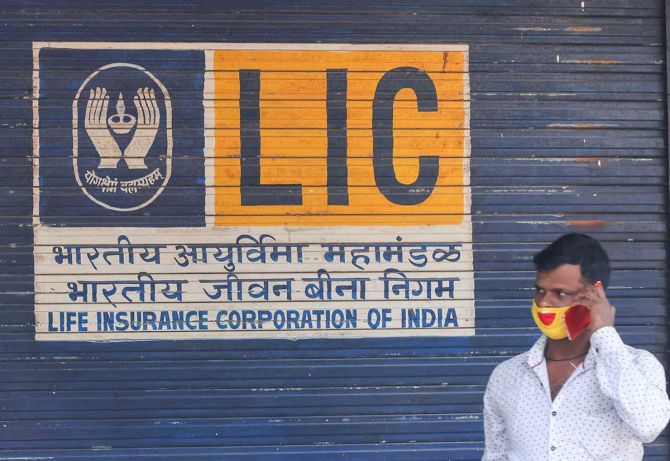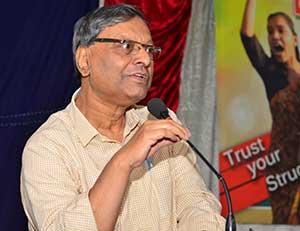'How can you explain the necessity of selling an institution that has been delivering regular returns to the government, that has never asked for any capital from the government, that has invested Rs 38 lakh crores in the Indian economy and that owns 4 per cent of the market capitalisation in India?'

The biggest-ever IPO in the country is ready to happen in days now that India's largest insurance firm, the Life Insurance Corporation of India, has filed papers with SEBI.
The government plans to sell 316 million shares which is about 5 per cent of its equity share as part of its plan to raise Rs 65,000 crores (Rs 650 billion) through divestment.
What started off on the 1st of September 1956 as the State-owned Life Insurance Corporation of India when Parliament passed the Life Insurance of India Act and nationalised over 245 insurance companies and provident societies, is going to change now; after 65 years.
How will this decision affect the insurance sector in India?
"It is very certain that the government is not going to stop at 5 per cent. They have taken the mandate from Parliament to go up to 49 per cent. The question is, whether they can stop at 49 per cent... The government's action has made the future of LIC very uncertain," Amanulla Khan, former president, All India Insurance Employees Association, tells Rediff.com's Shobha Warrier. The final of a two-part interview:
Do you think an economic policy of this sort is not confined to this government alone, and they are just following what began with liberalisation?
In a way, it is true. If you go back to the Malhotra Committee recommendation in 1994, you will see that it suggested to open up the insurance sector to private participation including foreign participation.
It also said, dilute the stake in LIC and General Insurance by 50 per cent.
Then the governments went ahead and opened up the sector.
But till now, no other government had taken a decision to sell LIC -- whether it was the Vajpayee government or the Manmohan Singh government!
This government has taken a decision to sell LIC. We feel this is more political rather than economic.
Why do you think the decision is more political?
This government says it is not the business of the government to be in business, forgetting the fact that public sector plays a major role in the economy of the country.
Do you feel public sector is still relevant in a country like India where the social disparity is very high?
Absolutely. A large number of people in this country still depend on the state for their survival. Without the public sector, how do you give affordable public services to a large number of people?
That's why we feel this is more to do with the politics and ideology of new liberalism rather than making any economic sense.
Otherwise, how can you explain the necessity of selling an institution that has been delivering regular returns to the government, that has never asked for any capital from the government, that has invested Rs 38 lakh crores in the Indian economy and that owns 4 per cent of the market capitalisation in India?
It is very certain that the government is not going to stop at 5 per cent. They have taken the mandate from Parliament to go up to 49 per cent. The question is, whether they can stop at 49 per cent.
And we have the examples of the banking institutions and General Insurance before us. The same assurances were given through law, but the government brought an amendment to take away that promise of keeping 51 per cent in General Insurance. Now they say, they will sell at least one company in General Insurance, to begin with.
Now, they are going to sell two banks. They plan to bring a banking amendment bill reducing the government holding to 26 per cent.
So, these assurances cannot be taken at face value when you look at the actual performance of the government.
And the government wants to desperately do it before the 31st of March only to fill the fiscal deficit.
 IMAGE: Amanulla Khan. Photograph: Kind courtesy Amanulla Khan
IMAGE: Amanulla Khan. Photograph: Kind courtesy Amanulla KhanYou called this move unconstitutional...
This is unconstitutional in the sense that if you look at the directive principles of the Constitution of Articles 38-43, it very clearly talks about the responsibility of the sState, and how the economy has to be run.
It mandates that the government must take affirmative action to uplift the downtrodden, and it should ensure that no concentration of wealth should take place.
But we see more and more concentration of wealth in some individuals...
Yes, that's what we are seeing; that the entire wealth is concentrated in the hands of 100 or 120 billionaires.
Another thing that's happening is, monopolies are developing.
For example, all the airports in this country are owned by the Adanis today.
You feel, soon the economic policies will be dictated by these people?
Why talk about the future? That's what is happening right now. It will further aggravate.
The government wants to bail out Vodafone even when they say it's not their business to be in business.
We will see monopolies developing in the insurance sector too. All the 23 private companies are not going to remain for the next 4-5 years. There are going to be acquisitors and mergers and takeovers.
And in the 10 years or so, there will be 3 or 4 big private companies dominating the insurance sector, and LIC will have to compete with them.
The government's action has made the future of LIC very uncertain.
This will have an impact on the Indian economy if not today, definitely in future.
We see all the national assets that have been built over the years, are being handed over to a few business houses.
Feature Presentation: Ashish Narsale/Rediff.com










